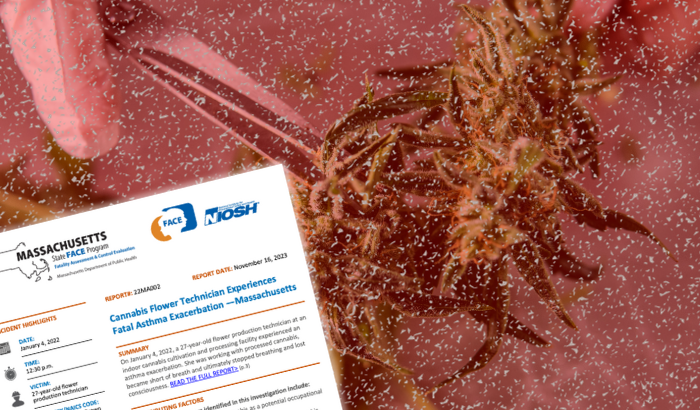
Latest details relating to the death of Lorna McMurrey at former Trulieve Holyoke facility
It will be years before a clear picture emerges of all the events that transpired around multi-state cannabis operator Trulieve which led to its exiting the commonwealth market. From the tragic “work-related fatality” of Lorna McMurrey in January 2022 following her experiencing respiratory complications on multiple shifts at the company’s Holyoke processing space, to their ghosting that New England flagship facility, the story is both possible proxy for other activity across the industry as well as a warning and canary in the cannabis goldmine turned coal mine.
Last month, Alex Halperin of WeedWeek and Eric Casey writing for his Burn After Reading newsletter reported extensively on nearly 400 pages of documents detailing the Occupational Safety and Health Administration investigation into this unprecedented “cannabis worker death from occupational asthma,” which both journalists requested and obtained through the Freedom Of Information Act. Among other revelations, in those documents OSHA states: “This is a work-related fatality. The deceased employee had substantial occupational exposure to ground cannabis, which is a recently identified allergen, symptoms consistent with occupational asthma, and she experienced severe shortness of breath prior to her cardiac arrest.”
In June 2022, OSHA fined Trulieve $35,219 for three hazard standards violations, but the fine was later reduced to $14,502 after the company entered into a voluntary settlement with the Department of Labor. On June 1, 2023, with their employees organizing, the multistate operator announced plans to “wind down its operations in Massachusetts” by closing dispensaries in Framingham, Northampton, and Worcester and ceasing all Mass operations by the end of this year. “These difficult but necessary measures are part of ongoing efforts to bolster business resilience and our commitment to cash preservation as we continue to focus on our business strategy of going deep in our core markets and jettisoning non-contributive assets,” Trulieve Chief Executive Officer Kim Rivers said in a statement.
In the latest development in the ongoing saga, on Thursday, the Massachusetts Department of Public Health released a report titled “Cannabis Flower Technician Experiences Fatal Asthma Exacerbation.” Though it does not mention McMurrey or Trulieve by name, it’s clear the former is the subject who “became short of breath and ultimately stopped breathing and lost consciousness.” Compiled by the state Fatality Assessment & Control Evaluation program in coordination with the National Institute for Occupational Safety and Health, the report outlines the scope of their investigation:
Review of the worker’s job tasks, exposures, and health history led to the finding that her exposure to the cannabis plant and ground cannabis at work contributed to her developing an allergy and ultimately asthma. The MA FACE program and partner investigators believe this is the first occupational asthma fatality in this U.S. workforce. Information from multiple sources taken together suggests that the victim did not have asthma prior to starting at the cannabis facility in May 2021.
Further details include: cause of death (“brain death, due to cardiac arrest (12 hours prior), due to respiratory arrest (spanning four days), due to presumed severe asthma attack); and contributing factors (“Failure to recognize ground cannabis as a potential occupational respiratory hazard; Failure to adequately control the spread of airborne cannabis dust; Lack of a comprehensive safety and health program and overall safety training”). Followed by six recommendations:
- Employers should assess and control hazardous materials in the workplace, including asthmagens.
- Employers should ensure that all workers are properly trained about hazardous materials in the workplace.
- Employers should develop and implement a comprehensive safety and health program that addresses hazard recognition, avoidance of unsafe conditions, and proper use of equipment.
- Employers should implement a medical surveillance program to monitor the health of their workers.
- Equipment manufacturers should adopt and implement the concept of Prevention through Design (PtD) to identify potential hazards associated with equipment and then eliminate these hazards through design changes.
- Industry licensing agencies in Massachusetts should consider how they can further support the health and safety of cannabis industry workers.
In May, the Nation magazine ran a comprehensive feature about cannabis industry working conditions on its cover. Written by former Daily Hampshire Gazette reporter Dusty Christensen and co-published with the Shoestring, an independent news outlet in Western Mass, the piece focused on McMurrey, and built on the muckraking of podcaster Mike Crawford, who broke the story in September 2022 on his podcast the Young Jurks and has followed it closely since.
This story is developing, as is news regarding a concurrent human resources shakeup at the Cannabis Control Commission. On the same day the DPH report came out, CCC acting Chair Ava Callender Concepcion announced that the agency’s Executive Director Shawn Collins is resigning from his post effective Dec. 4.
Talking Joints Memo reached out to Trulieve for comment in response to the DPH report, and will update this post accordingly.
























